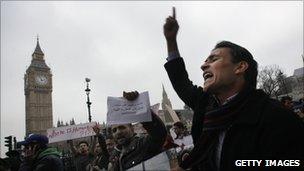Libya unrest: UK plans to charter plane for Britons
- Published
William Hague: ''The safety of British nationals is of paramount concern''
The UK government is making plans to charter a plane to Libya to help stranded Britons return home, Foreign Secretary William Hague has said.
Mr Hague said a Royal Navy warship, HMS Cumberland, would also be moved to wait off the Libyan coast.
Talks are under way to fly a charter aircraft to Tripoli within 48 hours.
Rights groups say nearly 300 people have died in the violence there so far. Meanwhile, Libyan leader Col Muammar Gaddafi has refused to stand down.
In his first major speech since unrest began last week, Col Gaddafi said the whole world looked up to Libya, protesters were "cockroaches" or "rats" and their protests were "serving the devil".
Reading from the country's constitution, he said enemies of Libya would be executed and vowed to fight to his "last drop of blood" rather than leave the country he has ruled for 41 years.
At a news conference in Whitehall, Mr Hague said the "worsening" situation in Libya "remained highly unpredictable" and the safety of British nationals in Libya was of "paramount concern".
Most of the 3,500 Britons resident in Libya are thought to have already left, but Mr Hague said a "rapid deployment team" of Foreign Office specialists would be sent to the country to help those still there.
"In light of the fluid and dangerous situation, we are urgently reinforcing our team on the ground with specialist personnel to provide help and assistance to British nationals," he said.
The foreign secretary said the UK was "urgently seeking landing clearances and permissions from the Libyan government" so that it could charter a plane.
He said British people were experiencing "significant difficulties" leaving Libya, and a number were stranded at Tripoli airport with no immediate flights out.
HMS Cumberland was also being redeployed from the eastern Mediterranean to international waters near Libya, he said, so that it would be in a position to "play a role in assisting British nationals".
Tens of thousands of foreigners are trying to leave the country by land and air and many oil companies are attempting to remove their expatriate staff.
One Briton, whose relatives are stuck in Tripoli, described chaotic scenes at the airport and said the UK government was doing nothing to help them.
The woman, who asked not to be named, told BBC News: "The Foreign Office has told everyone to leave Libya, however there are no flights available.

Hundreds gathered in Downing Street to call for Gaddafi to leave and to demand help from the UK
"My brother-in-law was advised to take cash to the airport as the cash machines are not working. He has bought six tickets with cash and has not been able to get on any flight."
British Airways and British Midland International cancelled flights in and out of Tripoli on Tuesday. Other UK airlines are thought to have followed suit.
The airlines stressed they were monitoring the situation and were trying to keep passengers informed.
Italy, Greece and the Netherlands are sending transport planes to Libya to get their citizens out. Austria and Portugal have already done so.
The Foreign Office has advised, external against all but essential travel to Libya.
Relatives of people currently working and living in Libya told the BBC of their concern for their relatives.
Julie O'Shea, from Uddingston in Glasgow, said she was worried about her father, an oil worker.
"My dad is stuck in the Amal desert in Libya and fears for his life. We haven't heard from him since last night. He is currently in staff quarters.
"Even though there is security, they have been targeted by looters and have had all vehicles stolen so there's no way out even if they wanted to leave."
Meanwhile about 500 people demonstrated outside Downing Street, some carrying placards urging ministers to "act now before genocide in Libya".
But the crowd's anger was mainly directed at the Libyan leader.
"We want Gaddafi to leave", said Abudlfatah Dhawag, a 31-year-old chef from Camden in north London.
"The world doesn't care. They just take the oil."
The Libyan authorities have reacted fiercely to the outbreak of protests in the country, which have come amid anti-government unrest in many other countries in the region.
The UN Security Council and Arab League have both called emergency meetings over the crisis.
Mr Hague also backed calls for a "full and transparent" investigation into reports of attacks on civilians in Libya and said Britain would continue to press for access for human rights monitors in the country.
"The Libyan government is trying to stop the world seeing what is happening in Libya, but we will do everything we can to make sure they're held accountable for their actions," he said.
- Published22 February 2011